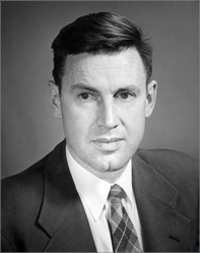Robert F. Christy (1916-2012) was a Canadian-American theoretical physicist
Christy’s doctoral advisor at the University of California, Berkeley was Robert Oppenheimer, but Christy’s initial involvement with the Manhattan Project came at the Metallurgical Lab at the University of Chicago. Originally, Christy was tasked to work on theoretical design, but Nobel prize-winning physicist Enrico Fermi took notice of the young Canadian’s work and invited him to contribute to the experimental design of Chicago Pile-1. Christy remained at Chicago to witness the first self-sustaining nuclear reaction in history on December 2, 1942. Afterwards, he was invited by Oppenheimer to work in Los Alamos with Hans Bethe on the design of the atomic bomb.
It was here that Christy was credited with his biggest accomplishment; the successful blueprint and construction of an atomic weapon with a solid-core of plutonium, as opposed to the hollow-core that was more likely to fizzle upon detonation. Edward Teller had theorized the concept of a solid-core, but it was Christy that made it a reality. The solid core was dubbed a “Christy pit,” a term that remains in use today. Christy’s contribution to the Manhattan Project was great enough that his fellow scientists used the term “Christy gadget” as a euphemism for the atomic bomb.
After the war, Christy would take a position at the California Institute of Technology (Caltech) on the recommendation of Oppenheimer. Caltech became his academic home for the remainder of his career. In 1973, he re-married, to a fellow phyisicist Inge-Juliana Sackmann.
Following Edward Teller’s testimony in the Oppenheimer security hearing in 1954, Christy found himself in the public light after refusing to shake Teller’s hand. Christy and Teller had actually lived together in Chicago for a short time, but following the trial, their relationship was strained, and remained that way for decades.





